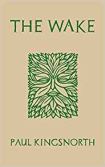The Wake by Paul Kingsnorth
Long listed for the Desmond Elliott Prize 2015
| The Wake by Paul Kingsnorth | |
|
| |
| Category: Historical Fiction | |
| Reviewer: Rebecca Foster | |
| Summary: Kingsnorth calls his Booker-longlisted fiction debut 'a post-apocalyptic novel set 1000 years in the past'. Written in the author's own version of Old English, the story traces the English guerrilla resistance movement that followed the Norman Conquest. | |
| Buy? No | Borrow? Yes |
| Pages: 384 | Date: March 2014 |
| Publisher: Unbound | |
| External links: Author's website | |
| ISBN: 9781908717863 | |
| Video:
| |
Paul Kingsnorth refers to his Booker-longlisted fiction debut, The Wake, as 'a post-apocalyptic novel set 1000 years in the past'. This ambitious story traces the three-year Ely resistance movement that followed the Norman Conquest. The guerrilla fighters were led by a figure named Hereward the Wake – thus the title. The first thing any review must note is the language: set in 1066-8, this historical novel is written in what Kingsnorth calls a 'shadow tongue' or 'pseudo-language', not quite the Old English you encountered reading Chaucer or Beowulf at school, but similar. I would strongly recommend that any diligent reader start by perusing the partial glossary and 'A Note on Language', both appended at the end of the text.
Even so, expect to be more or less lost for the duration – and plan on devoting at least four times the hours that you normally would to a book of this length. With no capitalisation and very sparse punctuation, the book has a repetitive, run-on feel. Like the oral traditions it draws on, it might benefit from being read aloud, which could also help with the phonetic approximation of archaic vowel sounds and adapted consonants (such as f = v; c = k or ch).
The narrator, who, we later learn, calls himself Buccmaster of Holland, opens with a mood of apocalyptic despair: 'so it is when a world ends'; 'all is broc [broken].' He is one of the brave few still patriotically resisting the rule of 'the bastard duc geeyome [William I]'; 'still I will stand and I will tell the triewth,' he declares. After a prologue, he returns to the events of 1066, remembering tales told by his grandfather and ill omens like ravens and visions of blood-red trees. He was a simple Lincolnshire fens farmer back then, married with two sons, until 'that sumor when efrything gan wrong.' News came that the French had castrated King Harald, and men with weapons arrived to call his sons to the fight.
Drawing strength from his grandfather's memory and his belief in pagan gods, Buccmaster sets out on foot with a motley band of five followers 'to tac baec my ground', through brutal violence whenever necessary. He feels that the English must fight for their survival, or else 'our cildren will haf frenc names they will spec frenc words all that we is is bean tacan from us.' This is a struggle not just between two races or ways of life, but also between two belief systems. The Christian clergy seem like a malevolent force, whereas Buccmaster portrays his pre-Christian traditions as natural and good; 'all my lif I has worced to right yfel [evil],' he claims. He also alludes to magical creatures, 'the aelfs and the dweorgs [dwarves] and ents', which for many will call up images from Tolkien's The Lord of the Rings.
For me, the mythological material is the most interesting, including references to 'grene men'. It is also intriguing to spot how early certain curse words entered the language: 'there will be fuccan blud', as Buccmaster eerily forecasts. Yet I struggled with even a very basic understanding of the plot and characters; I had to keep reminding myself who people were, when they had first appeared, what year it was and what was happening. The repetitive nature of Buccmaster's laments does not help in this respect. This novel is hard work, requiring patience and effort from any reader; for some, that will be enough to put them off. Prior experience of or interest in Old English chronicles would certainly be an advantage.
Another fact worth mentioning is that The Wake is the result of crowd-funding via Unbound – perhaps the first Man Booker Prize nominee to arise from non-traditional publishing. So, for its publication journey as well as its linguistic ambition, this was always going to be a stand-out novel. However, for me it was more an interesting experiment than a readable book. Indeed, in an interview on the Man Booker Prize website, Kingsnorth admits that he did not give much thought to his book's readability: 'Did I worry that readers would struggle? In all honesty, I barely thought about readers at all. I don't think writers should have readers in mind as they're doing their work.' I would not want to suggest that authors should pander to their readers' tastes, but there is also such a thing as being wilfully opaque.
Kingsnorth is developing this book into a loose trilogy covering 2000 years of mythical English history. The second volume, he assures readers, is set in the present day and written in modern English. Now that I can get on board with.
Further reading suggestion: Harvest by Jim Crace is another Booker-nominated apocalyptic tale of the English countryside. Ulverton by Adam Thorpe, set over multiple time periods, mimics the language of each era represented. Beowulf by Michael Morpurgo is a modern retelling of the Middle Ages classic, aimed at children or teens.
Please share on: ![]() Facebook,
Facebook, ![]() Twitter and
Twitter and
![]() Instagram
Instagram
![]() You can read more book reviews or buy The Wake by Paul Kingsnorth at Amazon.co.uk Amazon currently charges £2.99 for standard delivery for orders under £20, over which delivery is free.
You can read more book reviews or buy The Wake by Paul Kingsnorth at Amazon.co.uk Amazon currently charges £2.99 for standard delivery for orders under £20, over which delivery is free.
![]() You can read more book reviews or buy The Wake by Paul Kingsnorth at Amazon.com.
You can read more book reviews or buy The Wake by Paul Kingsnorth at Amazon.com.
Comments
Like to comment on this review?
Just send us an email and we'll put the best up on the site.

